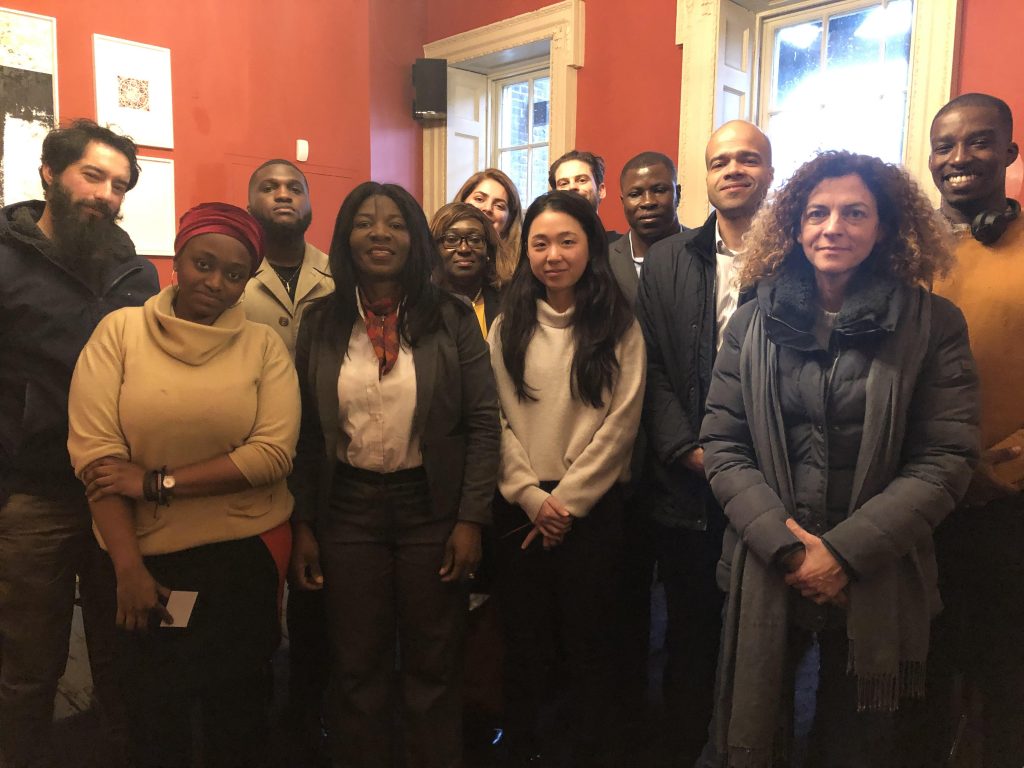In the latest CRE blog, PhD researchers Francis Naab and Ivy Matoju reflect on a recent visit to London where they presented their research to a newly launched social enterprise.

On 20th Nov 2019, we attended a seminar held in London as part of the panel speakers for Bobab Africa, a recently launched social enterprise and online platform which aims to bring researchers and industry in Sub-Saharan Africa together to share ideas, form collaborations and generally work together for the development of the Continent. They are keen to hear from a broad range of individuals whose work (be that research or otherwise) focuses on sub-Saharan Africa. This includes early career researchers such as ourselves.
As part of their initiative of fostering collaborations, the Bobab Africa platform hosts seminar talks that can be viewed online or attended in person. Each seminar is focused on a different area, with the one we attended centred around “A growing ecosystem: Supporting off farm innovation for inclusive agricultural development”. Its main purpose was to foster discussions around policy reform related to off-farm innovation and enterprise, business models and how they work, education and training for youth engagement, and job creation along the agri-food chain. So how does our research fit within this?
Francis
My presentation focused on agricultural policy in Ghana, which has been a core part of my PhD research. More specifically, I discussed policies that affect the agri-food chain via two different routes: those that influence food production and those that influence demand for agricultural products, such as the Livelihood Empowerment Against Poverty (LEAP) programme that has been the focus of part of my PhD research. Whilst several of these reflect the key focus of government to increase staple food production and create a ‘Green Revolution in Ghana’, a financing gap to further support this exists, created by the recent banking crises in Ghana and the subsequent reform of the microfinance sector and other informal credit schemes.
As smallholder farmers form the majority of the rural population in Ghana, they are particularly hard hit by this recent banking restructure, which primarily served rural local communities and makes it difficult to invest. This is further compounded by a lack of a widely implemented agricultural insurance policy which would help with the increased climate variability in the country. Innovation within the agricultural sector has an important role to play in addressing this challenge, and I highlighted two Ghanaian start-ups as good examples of this: Cowtribe, which provides extension services to about 29000 livestock farmers using a mobile application, and SyeComp which renders services such farm mapping, localised weather forecasts, farm financing and value chain traceability. More organisations like this will be important in the future for helping in areas where government support is currently not strong.
Ivy
Innovation was an important part of the work I presented. More specifically: the acceptance of innovation at the policy level in sub-Saharan Africa and how this has changed over time: from of the Lagos Plan of Action (1980) to the current Science, Technology and Innovation Strategy (2014). My presentation covered some of the hurdles faced when implementing such policies, especially within the agri-food chain. Using an example of genetically modified foods, I highlighted the contrast between public perceptions in Kenya and Tanzania (the two case study countries for my PhD) regarding genetically modified foods and their acceptance at the policy level. These differences may well be due to misinformation and a lack of public awareness, especially for those in the rural areas, and the pragmatic steps adopted by the governments in the form of controlled laboratory and field trials. I also emphasised the need for more inclusive societal participation in policy development, with this currently being limited. This should aid in efforts to increase awareness and acceptance of policies, thus helping ensure their effective implementation at all levels. My ongoing research will be looking to explore policy development further with a range of stakeholders involved in the food chain, and hopefully I can make more specific recommendations as my PhD progresses.
The event was live streamed and well attended, with discussions around the presentations ranging from agricultural initiatives, to power dynamics, to policy and microfinance. It proved a great opportunity for networking and to discuss our findings with other researchers from across the UK, as well as find out more about how other people are looking to tackle some of the challenges focused on during the seminar. The Bobab initiative provides a great motivational space for facilitating these conversations and we’re looking forward to future events.
For more information on Bobab Africa visit their website: https://bobab.org/
